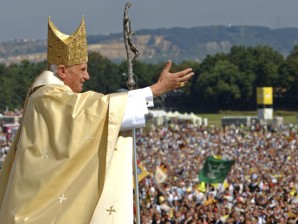
In this Sept. 12, 2006, file photo, Pope Benedict XVI waves to the crowd at the end of a papal Mass in Regensburg, southern Germany, some 120 kilometers (about 75 miles) northeast of Munich. When Benedict steps down on Feb. 28, 2013, his reputation as a brilliant theologian will remain intact. But he fell short of the mark he set for himself on unifying the church, building relationships with other religions and restoring the church’s influence in broader society. During his 2006 visit to Regensburg, he was sharply criticized by Muslims when he quoted a Byzantine emperor who characterized some of the teachings of the Prophet Muhammad as “evil and inhuman.” AP/Wolfgang Radtke, Pool, File
VATICAN CITY—The Catholic Church entered uncharted waters on Tuesday after Pope Benedict XVI’s shock announcement that he would become the first pontiff to resign in more than 700 years.
The 85-year-old Benedict told a group of cardinals in a speech in Latin on Monday that he will step down on February 28 because he could no longer fulfil his duties in a fast-changing world.
A report in Italian daily Il Sole 24 Ore said his decision may have been for health reasons.
The newspaper said Benedict underwent heart surgery less than three months ago to replace his pacemaker — an operation that was kept out of the public eye.
While the surgery went well, the report quoted advisors as saying that it made the pope reflect on whether he could continue to guide the Church.
The Vatican has said the decision was not due to illness.
Only a few advisors knew of the pope’s plan and many in the Vatican hierarchy were caught off guard, with Cardinal Angelo Sodano saying it was “like a lightning bolt in a clear blue sky.”
Sodano embraced the pope following the momentous announcement, after which the pope returned to his rooms in the Vatican’s Apostolic Palace and broke down in tears, Italian daily La Stampa reported.
“He could not hold back the emotion any more,” the report said, adding that the pope had taken his decision after suffering a fall during a trip to Mexico and Cuba last year that was not made public.
Several observers said Benedict wanted to avoid the fate of his predecessor and mentor, John Paul II, who suffered a long and debilitating illness.
French cardinal Paul Poupard said it was clear from the start of the pope’s speech to around 50 cardinals that he was stepping down.
“I understood from the very first words and I said ‘My God’,” he told France’s Le Figaro newspaper. “I saw the faces opposite me express astonishment, stupor.”
Ordinary faithful among the world’s 1.1 billion Catholics were stunned by the announcement.
“An historic, unexpected and humble announcement,” read a headline in Avvenire, the newspaper of the Italian bishops’ conference.
The official Vatican daily, L’Osservatore Romano, said it was “an unprecedented event”.
Some faithful said the move was a courageous act that would breathe new life into a Roman Catholic Church struggling with multiple crises and could possibly set a precedent for ageing popes.
Others expressed dismay that a leader whose election by the Church’s cardinals is believed to be divinely inspired could simply decide to quit.
World leaders said they were respectful of the decision and praised his pontificate, particularly for increasing inter-religious dialogue.
The pope’s eight-year rule — one of the shortest in the Church’s modern history — also earned him plenty of enemies, however, from the gay community and AIDS activists to the many shocked by the abuses of pedophile priests and the multiple cover-ups.
An academic theologian and the author of numerous tomes, including a trilogy on the life of Jesus Christ, the pope was often seen as somewhat distant from the day-to-day running of the Church.
The Vatican said the ex-pope would initially stay at the papal summer residence of Castel Gandolfo near Rome and then retire to a former monastery with a flower garden inside the Vatican walls — a stone’s throw from where his successor will live.
Speculation over who could be the next pope was already in full swing in Rome, although even seasoned observers cautioned that predictions of future popes are notoriously unreliable.
The field appears wide open, with some saying the papacy could return to an Italian for the first time since 1978, others saying it could go to a North American candidate and still others saying Africa or Asia could yield the next pope.
Several analysts said the fact that the pope was resigning precisely because of his advancing age could favor the choice of a relatively young pope.
The Vatican has said it expects a new pope to be in place in time for Easter, which falls on March 31 this year, although the decision is ultimately up to the cardinals meeting in a secret conclave.
They send a signal of black smoke each day until a decision is taken with a two-thirds majority.
White smoke is then put out from the Vatican palace when a candidate has been approved.
The new pope is then presented to cheering crowds in St Peter’s Square with the famous Latin cry: “Habemus Papam!” (“We have a pope!).